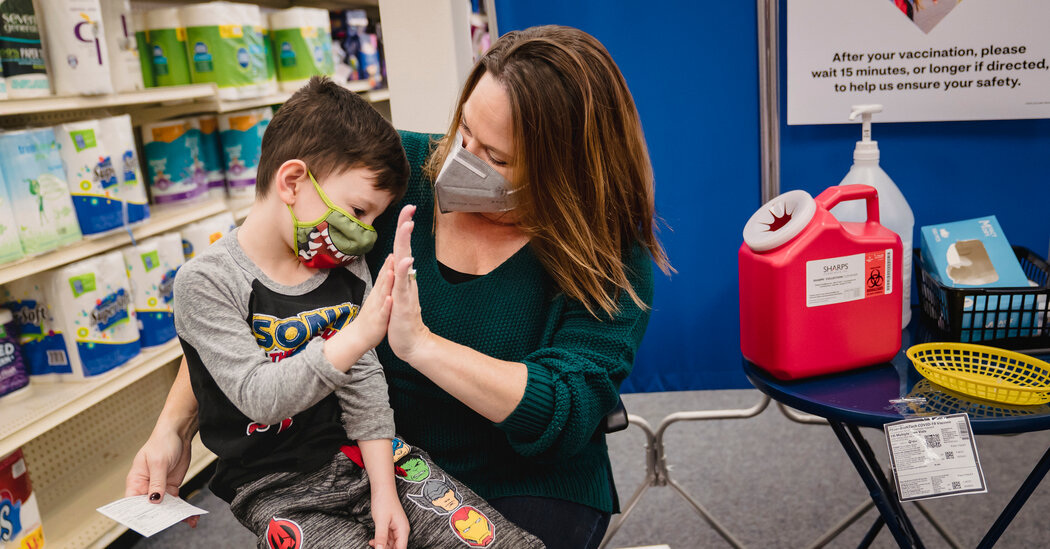Parents Grapple With How Long to Wait for Their Children’s Second Shots
Waiting eight weeks or more between doses may boost immunity. But as Omicron slams the United States, waiting also comes with risks.When Dr. Joshua Ishal got his 5- and 7-year-old daughters their first doses of the Covid-19 vaccine last week in Queens, he joined millions of other parents in protecting their 5- to 11-year-old children since the Pfizer-BioNTech vaccine was authorized for this age group in late October.Dr. Ishal, a dentist who lives in Great Neck, N.Y., never questioned whether he would get his children vaccinated, but he has been wavering over the timing of their second shots.The clinical trials that tested the Pfizer vaccine separated the doses by three weeks, which is why the U.S. Centers for Disease Control and Prevention recommends that interval. But emerging data suggests that a longer wait bolsters the immune response in the long run. What’s more, the extra time may reduce the risk of myocarditis — heart inflammation — a rare but serious side effect of the mRNA vaccines in adolescents and younger adults.Health authorities in Canada recommend that children wait at least eight weeks between doses. In Britain, kids wait 12 weeks for the second shot.Still, the potential benefits of waiting for the second dose must be balanced against the real risks of catching and spreading Covid during the wait. With the United States on the cusp of another major wave of cases and the new Omicron variant spreading rapidly, delaying means leaving children vulnerable to infection and illness for longer.“I think that’s a hard call,” said Aubree Gordon, an infectious disease epidemiologist at the University of Michigan School of Public Health.Is it more important for children to have good protection sooner? Or a better, more lasting protection later? The conundrum reminds Dr. Ishal of an episode of Seinfeld in which Jerry tells a story about picking a cold medicine from a wall of options at the drugstore. “This is quick acting, but this is long-lasting,” Jerry said. “When do I need to feel good, now or later?”Trish Johnson, a financial adviser in Oakland, plans to push her son’s second dose back to six or even eight weeks. She has been swayed, she said, by the studies showing that a longer interval between doses leads to a better immune response.“I’ve taken it upon myself, especially during this later part of the pandemic, to follow doctors on Twitter and do my own investigation,” she said. Almost two years into the pandemic, she feels that public health officials are taking too many precautions and failing to adapt to changing data. “That doesn’t work for me anymore,” she said.Dr. Joshua Ishal, at home in Great Neck, N.Y., did not hesitate to get his two daughters vaccinated but is less sure when the best time would be to get them their second shot.Desiree Rios for The New York TimesMany experts agree that three weeks between doses is too short an interval for an optimal immune response.“From an immunological standpoint, it makes more sense to wait,” said Deepta Bhattacharya, an immunologist at the University of Arizona. Pfizer didn’t choose three weeks between doses because it was the perfect interval. That decision, he said, “was more about public health and reducing community transmission, and completing this process quickly.” Dr. Bhattacharya plans to hold off on a second dose for his children until eight weeks.The immune system needs time to ramp up after that first dose. Immune cells in the blood, known as B cells, can start producing antibodies within a week. But to generate really high-quality antibodies, those cells need to go through an intense kind of training camp inside the lymph nodes, and that process takes more than three weeks.“You need them to sweat a little bit, those B cells,” said Andrés Finzi, an immunologist at the University of Montreal.Much of the research on different dosing intervals comes from countries, like Canada and Britain, that opted to wait on the second shot for adults when vaccine doses were scarce last winter and spring. Dr. Finzi and his colleagues examined the immune response in 26 people who received their second shots three months or more after their first. They also looked at responses in 12 people who received their shots four weeks apart. The two groups produced roughly the same quantity of antibodies, but the group with a longer interval between doses produced stronger antibodies with a greater capacity to latch onto the virus and stay there.In Britain, officials lengthened the dose interval for all vaccines to 12 weeks last December. Researchers at the University of Oxford studied hundreds of health workers who had received second doses before or after that policy took effect.Their study found that people who waited 10 weeks between their first and second doses had antibodies levels about twice as high as those who only waited three or four weeks. Those antibodies are produced by B cells, which continue to develop over that long interval.“It seems that giving the second dose at three to four weeks is just a bit too soon for your B cells to be ready to receive that boost,” said Susanna Dunachie, an immunologist at the University of Oxford, who led the study. What’s more, the longer dose interval also affected T cells, which help ramp up the body’s immune response. After the long interval, the T cells of study participants produced greater quantities of interleukin-2, a chemical signal that helps long-term immune memory.“We were quite surprised,” Dr. Dunachie said.She added, however, that a more robust immune response measured in the laboratory would not necessarily translate to better protection in the real world.The Coronavirus Pandemic: Key Things to KnowCard 1 of 4A new U.S. surge.
Read more →
